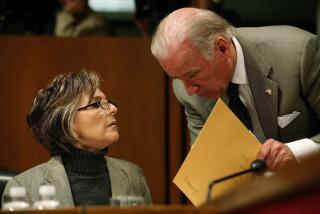Cory Booker launches an unconventional White House bid built on ‘universal love’

The New Jersey senator says “the only way we can make change is when people come together.”
Reporting from Washington — Cory Booker’s unremitting optimism, wonkish attraction to big ideas and, of course, his background as a community organizer have long drawn comparisons to another pioneering African American lawmaker who went on to bigger things: Barack Obama.
Whether Booker can ultimately harness it all as successfully as Obama did is about to be tested. On Friday, the New Jersey senator launched his White House bid.
“People in America are losing faith this nation will work for them,” Booker said at a news conference in front of his house in Newark, hours after announcing his run in a video to supporters. “They are beginning to believe too many folks are going to get left out or left behind. They are beginning to believe that the forces that pull us apart are stronger than the forces that pull us together. … It is about time we get to the hard work of building this nation to be what we want us to be, our best values, our best ideals, the best of who we are.”
Booker is entering an increasingly crowded field, where he is up against some close Senate colleagues whose progressive bona fides overshadow his own. He is the fourth Democratic senator and second black candidate to enter the race.
But the senator has proved adept at carving out an independent ideological lane, taking an approach to confronting President Trump and the GOP that veers in a direction different from that of other marquee candidates. “There is no Republican or Democrat way to get there,” he said of moving the country forward. “You definitely don’t get there by fighting each other, beating people down.”
Booker began his career as a political neophyte who toppled an entrenched and corrupt Newark mayoral administration in 2006. The fight, which the Rhodes scholar and Yale Law School graduate waged from an apartment he had taken in a public housing project, drew national attention to Booker after the release of “Streetfight,” a documentary that captured the initial battle, frame by frame, in 2002, when Booker first ran but fell short.
But on the stump Booker hardly presents as a street fighter. He talks of “universal love” and building bridges. He confronts the anger Trump vents on Twitter with hopeful rhetoric.
2020 Democratic presidential candidates: Who’s in and who’s on the fence? »
“Let me tell you right now: I love Donald Trump,” Booker said on CNN just after Trump mocked his speech before the Democratic National Convention in 2016. “I don’t want to answer his hate with hate. I’m going to answer it with love. I’m not going to answer his darkness with darkness. I love him.”
And on ABC’s “The View” on Friday: “Love thy neighbor, no exceptions.”
Skeptics question the authenticity of it all, and find the senator’s tone too saccharine in these tumultuous times. In addition, his warm ties with major financiers and venture capitalists — once considered a major political plus — now make him suspect in the eyes of some in the party’s populist wing.
“He has a message of unity and optimism, but the question is whether that is what voters are looking for,” said Andra Gillespie, an African American politics scholar at Emory University in Atlanta and author of “The New Black Politician: Cory Booker, Newark, and Post-Racial America.”
“Because of who he is and how his career developed, Booker will be talking a lot about reconciling. In this hyper-polarized environment where feelings are raw on both sides, I don’t know if people will get to the point of recognizing they need a reconciler,” she said.
Yet at a time many Democrats say they want a new, more diverse generation of leaders with fresh ideas and fresh energy, Booker checks a lot of boxes. The 49-year-old has been positioning himself as the party’s future for most of his political career. He is a gifted orator who can wax inspirational on thorny issues of race and class in a way that appeals to whites and nonwhites alike.
With him on “The View” was his mother, Carolyn, a civil rights activist who coordinated an anti-discrimination sting operation with local authorities in the New Jersey suburb where Booker was raised. Real estate agents were refusing to sell to black buyers, so the operation involved a white couple posing as the Bookers and making an offer, with the Bookers then showing up on closing day.
Cory Booker took a lead in working across the aisle with Republicans and the Trump administration on the criminal justice reform law passed at the end of the last Congress. After Democrats lost the White House in 2016, Booker became one of the first senators from the more mainstream wing of the party to sign on to Vermont Sen. Bernie Sanders’ renewed push for Medicare for all, joining as a co-sponsor the day Sanders unveiled his bill in 2017.
Yet Booker remains a favorite of the establishment. He was on a short list of three contenders to be Hillary Clinton’s vice presidential pick.
An eclectic and prolific Instagram feed full of poetry and candid moments, a full-throated endorsement of marijuana legalization and a post-partisan innovation agenda are all promising marketing tools for luring the younger voters Democrats are desperate to activate. The bachelor senator also scored points with party activists by refusing for years to address speculation that he was gay, responding that his sexual orientation was irrelevant. (Booker recently told the Philadelphia Inquirer that he is heterosexual.)
Booker has forged the kind of ties with Silicon Valley that are more typical of politicians from California, touting the virtues of venture capital and championing the launch of start-ups and incubators in inner-urban and rural areas as an antidote to poverty.
Even while a surrogate for Obama in the 2012 presidential race, Booker complained on “Meet the Press” that the Obama campaign was making a big mistake in attacking GOP nominee Mitt Romney’s private equity firm, Bain Capital.
“I’m not about to sit here and indict private equity,” Booker said at the time. “This to me, I’m very uncomfortable with.”
The senator’s connections on Wall Street and in Silicon Valley helped build his national reputation and have paid dividends for his constituents. In 2010, Facebook founder Mark Zuckerberg announced he was donating $100 million to an effort to fix ailing schools in Newark, N.J.
Though the results of the five-year initiative were ultimately mixed — an experiment in education reform that Newark’s current mayor calls an opportunity squandered — Booker’s ability to lure such private investment helped build his image as a change agent.
Today, however, the once-adoring relationship between Democrats and tech industry figures like Zuckerberg has soured. And Booker’s corporate relationships have fueled critiques on the left that he is too close to Wall Street, too politically calculating, and too willing to place his own ambition above progressive ideals.
Booker has joined other Democrats in disavowing money from corporate PACs, but the senator’s run is nonetheless being propelled in part by a $4-million political action committee recently started by a wealthy Bay Area attorney, Steve Phillips. Phillips hopes to lure millions more into the effort from other wealthy donors, exploiting a loophole in campaign finance limits that Booker rails against. His advisors reiterated on launch day that Booker opposes all super PACs, including the one run by Phillips.
Just as the campaign will test the senator’s commitment to campaign finance reform, it will also test his willingness to stick to the rhetorical high road. At moments over the last two years, the message of unity and love didn’t cut it, and Booker took a different tack.
He joined other Democrats, for example, in pursuing allegations of sexual assault against Brett M. Kavanaugh during his Supreme Court confirmation hearings. When Booker defied instructions from the panel’s Republicans to keep certain committee documents confidential, he deliberately violated the rule, declaring the move “about the closest I’ll probably ever have in my life to an ‘I am Spartacus’ moment.”
Booker’s move again attracted the national media spotlight, although the comparison to the heroic rebel slave of movie fame also drew ridicule.
In another high-profile Senate hearing, Booker delivered an angry rebuke to Homeland Security Secretary Kirstjen Nielsen when she said she hadn’t heard Trump call Haiti and certain African nations “shithole” countries during a White House meeting on immigration.
“When ignorance and bigotry is allied with power it is a dangerous force in our country,” he said. “Your silence and your amnesia is complicity.”
But on the campaign trail in last year’s midterm election, when Booker touched down in 24 states to campaign for Democrats, the theme was love.
“He will be more affirming and less attacking,” said Bob Shrum, director of the Center for the Political Future at USC. “Whether that will work, I don’t know.”
The approach, Shrum said, worked for Jimmy Carter in the 1976 election, in the aftermath of Watergate.
“Carter talked about having a country as full of love as American people,” Shrum said. “It was a unique time, and it secured Carter the nomination and a narrow victory in the general election.”
And even a positive tone doesn’t preclude a candidate from going on the attack. Carter, running in the shadow of President Nixon’s resignation, would seldom if ever mention Nixon’s name, but would pointedly assure voters he would never lie to them.
“A lot of this affirmative language can be implicitly negative,” Shrum said. “It just implies a different mood.”
More stories from Evan Halper »
evan.halper@latimes.com | Twitter: @evanhalper
More to Read
Get the L.A. Times Politics newsletter
Deeply reported insights into legislation, politics and policy from Sacramento, Washington and beyond. In your inbox three times per week.
You may occasionally receive promotional content from the Los Angeles Times.











